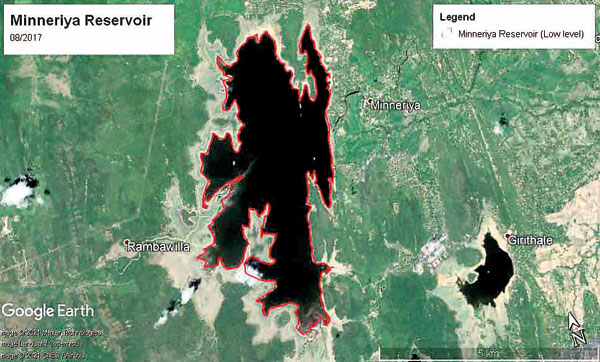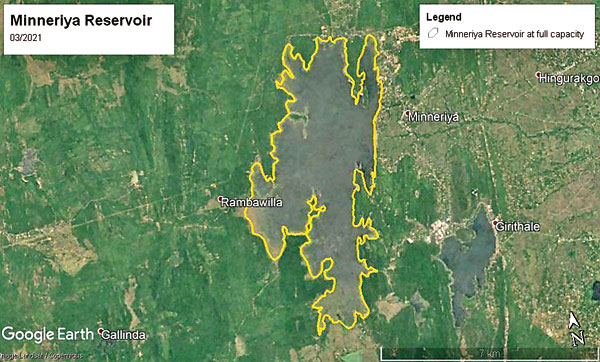News
Bring about a National Policy beneficial to humans & wild elephants before the next Dry Season
View(s):- Urgent plea to the President from former DWC DG, Dr Sumith Pilapitiya, to safeguard the tank-bed grasslands during the Dry Season
By Kumudini Hettiarachchi
An urgent plea is going out to President Anura Kumara Dissanayake to drive a National Policy for Water Management in reservoirs with grassland-dependent elephants, which would benefit both farmers and the wild elephant population during the Dry Season.
It is all to do with ‘balancing’ the storage and release of water from large tanks for irrigation during the Dry Season and also safeguarding the tank-bed grasslands essential for wild elephants. This will bring about a win-win situation for both groups, reiterates the former Director General of the Department of Wildlife Conservation (DWC), Dr. Sumith Pilapitiya.

A herd of elephants, part of the Gathering, at the Minneriya tank
Conservationists are certain that President Dissanayake, with a deep knowledge of agriculture while co-existing with wildlife in Tambuttegama in the heart of the North Central Province (NCP), will understand the vital importance of this balancing act.
“The woes of the wild elephants start in the Dry Season not just in the NCP but also in the southeast of the country,” says Dr. Pilapitiya who is studying elephant behaviour in Minneriya.
Specific as always, he zeroes in on huge tanks such as Minneriya, Kaudulla and Kala Wewa where the largest Asian Elephant Gathering can be witnessed.
There is a serious threat to The Gathering which draws hundreds of tourists, says Dr. Pilapitiya, pointing out that generally during the Dry Season, fodder availability for wild elephants is much less than in the Rainy Season.
 Aerial satellite images (1 & 2) of the Minneriya reservoir at a low level in 2017 with abundant grasslands (the red line depicting the water level and the lightly-shaded area adjacent, being the grasslands) and with full capacity in 2021 with not a blade of grass for the elephants
Aerial satellite images (1 & 2) of the Minneriya reservoir at a low level in 2017 with abundant grasslands (the red line depicting the water level and the lightly-shaded area adjacent, being the grasslands) and with full capacity in 2021 with not a blade of grass for the elephants

Experience and studies have shown that for wild elephants, a “very” good source of food is the grasslands that emerge when a large area of irrigation tank-beds get exposed in the Dry Season. The tender grass-shoots are like manna from the skies for the elephants, he says, going on to explain that during the Rainy Season, the tanks are brimming with water and the tank-beds are submerged.
It is during the Dry Season that the tank-beds get exposed and the tender grasslands spread across parts of the tanks. Regrettably, it is also when the authorities store excess water in these tanks, “artificially” and in a human-made action, submerging the grasslands. This deprives the wild elephants of their nutrition, he explains.
This conservationist points out that the tank-bed grasslands have a higher level of protein which is very nutritious and this is what attracts the large herds of elephants along with lots of babies. Water is just a secondary need.
“If the tanks are filled with water during the Dry Season between the Yala and Maha cultivation seasons, when according to the natural cycle they should be having swathes of tank-bed without water, the grasslands get submerged and the elephants will not come. There is also no real demand for water from the farmers during this time,” he says. (See box for a ‘side effect’ of this action)
“We have intervened and changed a centuries-old system in the past 20-30 years, by pumping water through canals into these tanks, when these tanks should be dry,” says Dr. Pilapitiya, specifying that the issue arises at tanks which are visited by large wild elephant populations for the grasslands.
Looking back to the near-past, he says that in 2019, when such releases and storage of water began in the Dry Season after the Moragahakanda-Minneriya project, the reduced availability of grasslands in Minneriya and Kaudulla led to a drastic reduction in elephant numbers, impacting severely on The Gathering.
In 2020, alarmed conservationists worked closely with far-sighted officials such as Mahaweli Development Ministry Secretary Anura Dissanayake and Water Management Committee (Water Panel) Chairman Nilantha Danapala, to bring about an urgent solution. The Water Panel decides on water releases into and out of reservoirs.
By 2021, The Gathering just disappeared with a 90% reduction in elephant numbers, says Dr. Pilapitiya. By 2022, with everyone working in tandem, the management of water for irrigation without depriving nutritious food for the elephants went smoothly and by 2024 and 2025, The Gathering, once reduced by 90%, was out in full force, while no farmer was deprived of water for agriculture.
Reiterating that conservation and development can work hand-in-hand, not compromising either, he says that it is an “excellent” success story which came with 4-5 years of work to create this balance because people were ready to listen.
The same should apply to other large and small tanks such as Kala Wewa, Mahakandarawa, Uda Walawe, Pokunutenne and Lunugamvehera, where elephants gather, he urges.
Dr. Pilapitiya’s logic is that if elephant conservation and water management can happen in tandem in some areas, it can also happen in others. The urgent need is a National Policy which takes into consideration the human requirement for irrigation and the animal requirement for food, as both needs are important. One cannot outweigh the other.
The Irrigation Department has a policy that it does not want to go against the edict of King Parakrama Bahu that not a single drop of water should go waste without productive use, he says, arguing that productive use is not just for agriculture alone but also for the benefit of the eco-system which includes wildlife.
Reservoirs are part of a cascade system – storage and release of water from reservoirs with no grasslands can be carried out as usual. The need is to think out of the box and come up with unique solutions benefiting all, he says.
Dr. Pilapitiya is appealing to President Dissanayake to bring in a National Policy before the next Dry Season. This will be beneficial to both humans and elephants and continue to generate much-needed foreign exchange through The Gathering.
| Proof of drop in HEC when tank-bed grasslands flourish The management of water while allowing the grasslands to flourish will reduce the human-elephant conflict (HEC), assures Dr. Sumith Pilapitiya. Talking with proof in hand, he says that in 2019, when water releases were carried out in the Dry Season after the Moragahakanda-Minneriya project, the reduced availability of grasslands in Minneriya and Kaudulla pruned down The Gathering numbers, while HEC incidents rose significantly. By 2021, with The Gathering disappearing due to the disappearance of the tank-bed grasslands, the HEC rose six-fold and elephants kept raiding villages, he says. He underscores that the higher the level of water in reservoirs such as Minneriya, Kaudulla and Lunugamvehera, preventing grassland-access in the Dry Season, the higher the HEC.  The pathetic body condition of a mother and baby even one year (2022) after the Minneriya reservoir was kept virtually full all year-round in 2021. Another tragic side-effect of not having grasslands is the impact on the body condition of female herds – studies by the Centre for Conservation and Research (CCR) at the Lunugamvehera National Park had found skeletal adult females and malnourished young calves. Similar observations had been recorded in 2021-22 in Minneriya and Kaudulla. While studies have not been done in Kala Wewa, anecdotal evidence points to the lack of grasslands having a major adverse impact on the health of the elephant population, says Dr. Pilapitiya, adding that there is no point in looking at the HEC in isolation. This is why a National Policy is needed, to cover all aspects for the benefit of humans and wild elephants.
| |
The best way to say that you found the home of your dreams is by finding it on Hitad.lk. We have listings for apartments for sale or rent in Sri Lanka, no matter what locale you're looking for! Whether you live in Colombo, Galle, Kandy, Matara, Jaffna and more - we've got them all!

